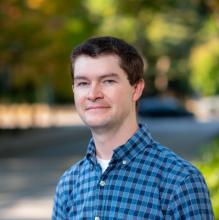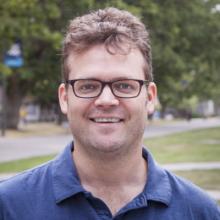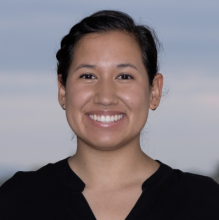Working with seniors in West End, Callista aims to reflect their voices and their experiences of loneliness and connectedness through audio-visual products that will be shared with the community and government representatives. Callista hopes that the ensuing dialogue will result in better and more effective strategies to support older adults at risk of social isolation.
Research Description
My research explores the loneliness and social connectedness experiences of community-dwelling older adults during the COVID-19 pandemic. I integrate mixed traditional (interview and survey) and visual (participatory photography and video) methods to gain insight on what helps or hinders older adults’ social connectedness. Social connectedness protects against loneliness and improves quality of life, physical health and mental well-being. To share research findings with community and government representatives, I will incorporate participant voices and photographs into a short video. I will launch the video at an event in Vancouver’s West End to raise awareness and encourage dialogue about community-based strategies that support older adults at-risk of loneliness.
What does being a Public Scholar mean to you?
Everything! It is why I pursue a PhD. It means that principles of partnership and reciprocity guide my research process. Being a public scholar also means a commitment to ensure that research outcomes are shared, understood, and applied to benefit the health and social interests of community.
In what ways do you think the PhD experience can be re-imagined with the Public Scholars Initiative?
The PhD experience is traditionally quite solitary. The PSI challenges that norm by underscoring the importance of building relationships in academic and non-academic arenas. The PSI also nurtures the idea that clear communication of research to broad audiences is integral to the PhD experience. In specific relation to my research, the PSI invites me to re-imagine my PhD by integrating non-traditional forms of scholarship, such as participatory photography and video into my doctoral work.
How do you envision connecting your PhD work with broader career possibilities?
I am passionate about a career that contributes to greater health and social equity through knowledge mobilization. Knowledge mobilization means working with organizations, communities, and individuals outside of academic settings to cultivate shared understanding of research-based knowledge. Only through shared understanding and forming essential relationships, will knowledge be effectively mobilized into policy, programs or practice in different settings. The experience I gain through my doctoral studies as a PSI Scholar emboldens me to consider career possibilities that traverse traditional academic and community, government or professional industry settings. A mentor once said “If you don’t see a clearly laid career path in front of you, you might just have to forge a new one.” Being part of the PSI better equips me to move forward down those less-travelled paths towards future career possibilities.
How does your research engage with the larger community and social partners?
I have established over 7-years, a trusted relationship with the West End Seniors Network (WESN), my primary community partner. Shortly after the onset of the COVID-19 pandemic, WESN and I collaborated to design research to address the challenges confronting older adults during this global catastrophe. With WESN as a social partner, I was able to engage directly with older adults—recognizing the great diversity as well as commonalities among this group. I also plan to engage more broadly with representatives from other non-profit organizations, and municipal and provincial government.
Why did you decide to pursue a graduate degree?
I love learning. I love to ask questions and engage in thoughtful discussions with fellow students, professors, and community partners. I am pursuing a graduate degree to cultivate knowledge and form relationships that will provide me the training, insight and tools to address complex health, equity and social issues. I embrace that with this great privilege, comes great responsibility to mobilize new knowledge to serve the greater good. I am most grateful for the opportunity to do so.
Why did you choose to come to British Columbia and study at UBC?
UBC has a strong track record of supporting innovative research and cross-sectoral collaboration through the Interdisciplinary Studies program. My supervisor, Dr. Sims-Gould, inspired me to conduct community-engaged research with older adults. She generously shares a wealth of knowledge and experience, that is not easily found elsewhere. Studying at UBC also positions me in close geographic proximity to a host of community partners.
What is it specifically, that your program offers, that attracted you?
The Interdisciplinary Studies program allows me to chart my own course to best achieve my academic goals. My committee is comprised of passionate and talented professors who have diverse backgrounds in the social sciences, health sciences, and arts-based, participatory methods and film. My program is ideal for self-directed learners. It really is a “choose your own adventure” program.
For you, what was the best surprise about graduate life, about UBC or life in Vancouver?
I am from Vancouver originally so I am well accustomed to biking year-round in the rain. However, the best surprise about returning to UBC, after spending time in the professional world, was meeting other students with whom I have formed new friendships. I value camaraderie, peer learning and support.
What do you see as your biggest challenge(s) in your future career?
I am really passionate about a career that involves knowledge mobilization. Knowledge mobilization means taking what we learn through research, and helping people understand and apply it in a policy, practice, and/or community settings. Historically in the Health Sciences it takes an average of 7 years for research to be applied in practice, if it’s applied at all. I want to reduce this time lag. I know this is a challenge, but it’s one that I am up for meeting head-on.
How do you feel your program is preparing you for those challenges?
The Interdisciplinary Studies program is preparing me for this challenge of effective knowledge mobilization as I have the space to look across disciplines for insights and solutions. I have also integrated an evaluation of community-engagement strategy as part of my doctoral research. These opportunities to learn will help me be a future leader in knowledge mobilization.
What aspects of your life or career before now have best prepared you for your UBC graduate program?
This is a tough question as I think all aspects of my life have prepared me for my graduate program in one way or another. I think it is beneficial to have time working as part of a research team, or in a professional setting, prior to grad school. It's also beneficial to have a self-care practice (like exercise or creative hobbies) as a counterbalance to school.
Do you have any tips for students from your home country coming to Canada / to UBC Grad School?
You are never too old or too young to start graduate studies. As a parent of a young child, I also want to share that you can pursue an advanced degree while raising a family. It is challenging, and I would recommend establishing your support networks (like childcare) in advance, but being a mother helps me focus and prioritize what really matters. Motherhood is not a hindrance, it’s a superpower.




